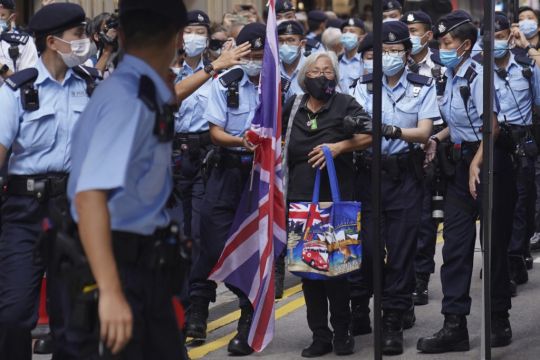A top Hong Kong official has marked the anniversary of the territory’s return to Chinese control by defending the national security law imposed a year ago.
Hong Kong Chief Secretary John Lee said the law stipulates that human rights are respected and would be used further in the coming year to ensure stability.
In the year since the law took effect, large-scale demonstrations have been banned and a number of pro-democracy activists and journalists have been arrested, ceased public activities or have left Hong Kong.
For the second straight year, authorities have banned the commemoration of the Tiananmen Square crackdown and the July 1 handover protest.

Police sealed off Victoria Park — until recently the site of annual pro-democracy rallies marking the 1997 handover — and put up flags warning people that they could be prosecuted if they enter or remain in the enclosed area.
Police said there were online calls encouraging people to take part in an unauthorised protest.
The security law was implemented as authorities cracked down on dissent after Hong Kong was rocked by massive anti-government protests in 2019.
Critics say Beijing has reneged on a promise to keep the special privileges for Hong Kong for 50 years — the autonomy of its courts and legal system, civil liberties that include a free press, freedom of speech and the leeway to take to the streets to protest.
For two years in a row, authorities banned an annual June 4 candlelight vigil commemorating the bloody 1989 crackdown on pro-democracy demonstrators in Beijing’s Tiananmen Square, and the July 1 handover protest, citing pandemic social distancing restrictions.
On Wednesday, Chow Hang-tung, a key organiser of the June 4 vigil, was rearrested on suspicion of inciting others to participate in an unauthorised assembly.

Police have arrested seven journalists and executives of the now-defunct Apple Daily, a pro-democracy newspaper that was a vocal critic of Hong Kong and China’s governments. Authorities also froze assets linked to Apple Daily, forcing it to cease operations last week.
Mr Lee was speaking at a reception commemorating the 24th anniversary of the former British colony’s return to China. It coincides with the centenary of the Chinese Communist Party on the mainland, where Hong Kong’s top leader, Carrie Lam, has been attending.
Mr Lee said Hong Kong was on the rebound as the national security law restored social and political stability.
“Our team has more confidence than ever in Hong Kong’s prospect. In the coming year, we will continue to uphold national security with determination and improve the implementation of the one country, two systems principle,” he said.
In Beijing, Chinese President Xi Jinping said in a keynote address during a celebration of the party centenary that China will uphold the “one country, two systems” framework in Hong Kong and Macao to ensure full sovereignty, social stability and maintain prosperity in the two regions.

On Thursday morning, amid a heavy police presence, four activists including Raphael Wong, the head of the League of Social Democrats political party, marched through the streets of Wan Chai carrying a banner calling for the release of political prisoners.
Even as authorities claim that social stability has returned to Hong Kong, some residents opt to leave the city for greener pastures. Holders of the British National Overseas passport, which was issued to residents before the 1997 handover, are now eligible to move to the UK on special visas.
In recent days, long lines of passengers have thronged the check-in counters of airlines flying to the UK.
Among them was Serena Leung, who booked a flight to Britain on Wednesday with her two daughters aged five and seven.
“I think that the UK’s human rights situation, freedom and education are better than Hong Kong,” the 40-year-old said.
“Although the UK is not a perfect country, we still have confidence that it will stay well over the next 10, 20 years. But I don’t have any confidence in Hong Kong, it will only get worse and worse.”







